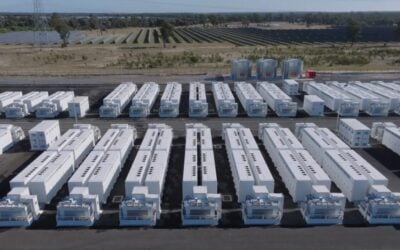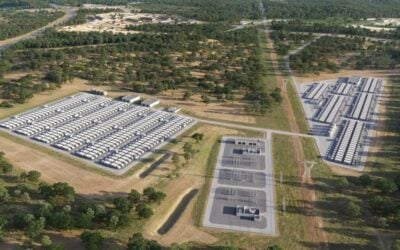Simpliphi Power claims its lithium-ion storage systems eradicate the issue of thermal runaway, and operate at 98% efficiency. Source: Simpliphi
Simpliphi Power’s cobalt-free lithium-ion storage systems, which claim to eliminate the threat of thermal runaway, have been integrated into the Global Sustainable Energy Solutions (GSES) inaugural solar mobile training courses in Australia.
These courses provide on-the-move training for installers to ensure they are both qualified and certified. According to GSES, the courses offer the ability to “gain experience in installing [PV] systems in a controlled environment using the latest products in the renewable energy industry.”
Enjoy 12 months of exclusive analysis
- Regular insight and analysis of the industry’s biggest developments
- In-depth interviews with the industry’s leading figures
- Annual digital subscription to the PV Tech Power journal
- Discounts on Solar Media’s portfolio of events, in-person and virtual
It is noteworthy that California-based Simpliphi’s products were chosen for the training. The company, who began providing its products for the US military and on Hollywood film sets, began its foray into the residential and light-commercial energy storage sector last year.
“We chose SimpliPhi because of their strong reputation and use in military applications. It is important to demonstrate products currently available in the market and which we were sure would perform given a proven track record and strong reputation,” said Chris Martell, principal engineer of GSES. “We have incorporated SimpliPhi batteries as part of our training centre as well as in our new mobile training unit. The GSES mobile training facility is the first-of-its-kind in the Australian market, and it will commence in Brisbane and extend our training to those users beyond our Sydney base.”
Simpliphi Power claims that its lithium-ion batteries, partnered with its internally-formulated battery management system (BMS) allow its products to eliminate the risks of thermal runaway; a chronic setback of such battery types. In addition, the products are ideal for the mobile units as they do not require any costly or bulky cooling/ventilation to prevent heat build-up, and operate at 98% efficiency, according to the company.
Simpliphi, who partnered with DPA Solar in November 2015 to distribute its storage technology in Australia, continues to gain traction in the country with its non-toxic lithium ferrous phosphate batteries being integrated into GSES’s mobile training units.
“SimpliPhi is gaining momentum in the burgeoning Australian solar plus energy storage market. This new GSES training course is the next phase in preparing a host of installers to integrate our proven and safe storage solution for Australians looking for greater energy independence,” said Catherine Von Burg, CEO of SimpliPhi Power. “As part of our commitment to the Australian market, we will be joining the industry’s leaders at the upcoming Australian Energy Storage Conference, where our solutions will be on display as well as their many benefits highlighted during my case presentation.”
Australia’s rapidly-emerging energy storage market
The announcement of the incorporation of Simpliphi’s batteries into the GSES training units follows closely the Clean Energy Council (CEC) guidelines for industry bodies and consumers alike; which is often a sign of a more sophisticated market.
Furthermore, GTM Research forecasted last year that the Australian energy storage market will reach 244MW by 2020, citing the country’s high PV penetration together with its expensive electricity rates as core drivers for growth. They also predicted that the residential market would be heading up the expansion of the storage market, with 44MW expected to be deployed this year.
In addition, the country has welcomed many home storage systems in recent times, on the back of its renewable energy auction that is estimated to lead to the deployment of 5,000 residential and commercial battery storage systems. Australia’s own Redflow brought out its ZCell and Enphase’s AC battery debuted in the country for A$1,150/kWh (US$838/kWh).
This month has also seen the Clean Energy Finance Corporation (CEFC) providing low-cost finance for domestic businesses to invest in solar and storage under the A$200 million (US$146 million) ‘Westpac Energy Efficient Financing Programme’.






